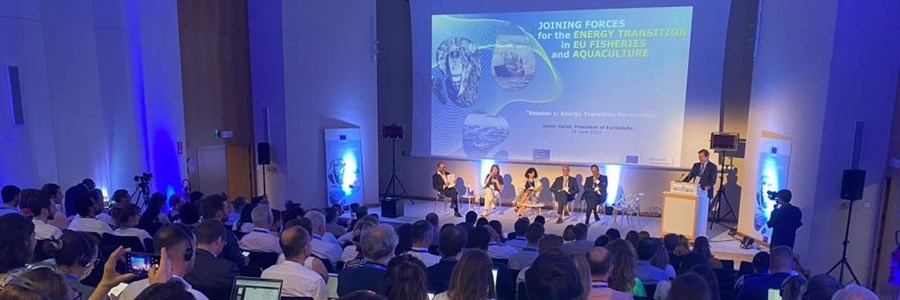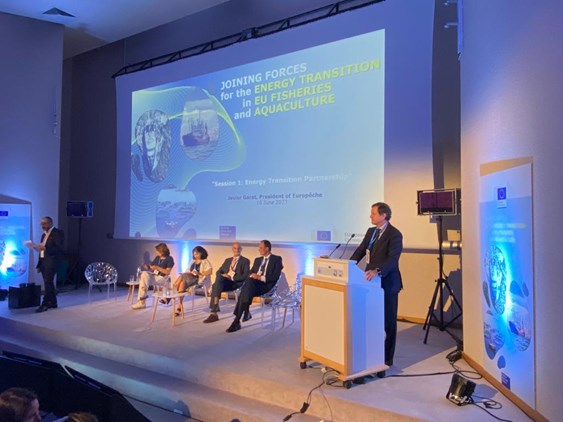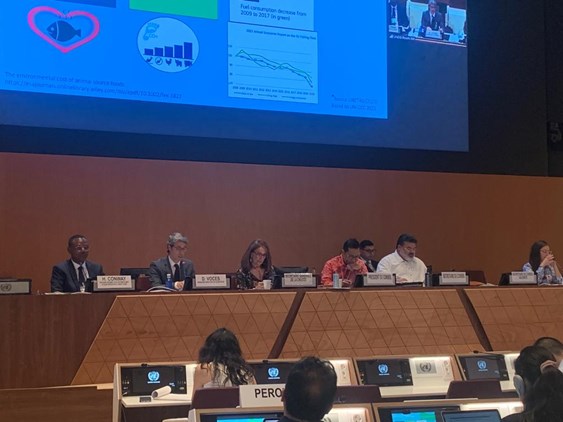Europêche leads global efforts to decarbonise the fishing sector

Europêche, the leading representative body of the European fishing industry, presented its vision to achieve the target of zero emissions in the sector by 2050. Invited as key stakeholder in high-level conferences organized by the United Nations Conference on Trade and Development (UNCTAD) [1] and the European Commission [2], Europêche reaffirmed its unwavering commitment to the pressing global need of reducing CO2 emissions, finding viable energy alternatives and decreasing dependence on fossil fuels. The organisation acknowledged the fishing sector's positive role in addressing climate change while emphasizing the importance of a just energy transition based on realistic time frames, strategic collaboration with academia and technology developers, removal of legislative barriers and provision of adequate funding.
Governments across the globe and its industries are looking for solutions that can help lower their greenhouse gas (GHG) emissions to reach the goals of the Paris Agreement. While the fishing sector's emissions constitute a minor fraction, accounting for only 0.1% to 0.5% of global GHG emissions in 2023, Europêche acknowledges the industry's responsibility in minimising its impact. The sector has already achieved significant progress, with emissions from the EU fisheries sector being reduced by 50% since 1990.
In the path towards decarbonisation, Europêche highlights the progress made by fishers in investing in selective fishing gears and reducing seabed contact, resulting in lower fuel consumption and emissions. EU vessels are increasingly adopting diesel-electric engines, efficient propellers and refrigeration systems, while actively participating in circular economy schemes. These efforts exemplify the industry's dedication to embracing low-impact practices.

Javier Garat, President of Europêche, declared: “The fishing sector is a key component of our society and an example to be followed. Fishers are at the forefront of the combat against climate change as providers of one of the healthiest animal proteins with a minimal carbon footprint. The EU fleet has been making progress on the path to climate neutrality since 1990. This should be the baseline year for the reduction of emissions for capture fisheries to recognise the efforts made by the sector”.
Europêche recognises though that the transition to alternative energy sources presents challenges, as certain technologies, such as hydrogen storage, require four times more space on board compared to traditional fuel oil. Given the fact that the EU fishing sector faces capacity restrictions concerning gross tonnage (space on board), impeding the installation of green technologies, Europêche advocates for adapting the definition of fishing capacity in Europe to enable fleet modernisation.
Europêche emphasises the necessity for institutional support and targeted financing to realize these ambitious goals. However, the EU fisheries fund is insufficient to cover the associated costs. Europêche encourages exploring additional sources of financing, such as the European Investment Bank, the creation of a new funds or simply revising the new fisheries fund (EMFAF). Furthermore, with the average age of the European fleet being 31.5 years, fleet renewal plans are imperative to facilitate the transition to a modern fishery. According to Europêche, changing the engine is neither sufficient nor feasible on such old vessels.

Daniel Voces, managing director of Europêche, concluded: “Achieving a complete decarbonisation of the sector necessitates a comprehensive approach that includes zero-emission energy sources, vessel modernisation, improved gear design and composition, reduced time spent at sea and a careful analysis of energy consumption per kilo of fish landed. This transition should not jeopardise the fishing industry’s continued contribution to sustainable EU food production and therefore requires a realistic timeline aligned with technological advancements, logistical considerations, and supportive legislation. Engaging all stakeholders within the supply chain and developing necessary infrastructures are also vital components of the process”.
[1] https://unctad.org/meeting/trade-and-development-board-seventieth-session
Ends
Press contacts:
Rosalie Tukker, Senior Policy Advisor of Europêche: +32 2 230 48 48 rosalie.tukker@europeche.org
Sources: Europêche
Attachments: